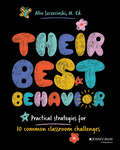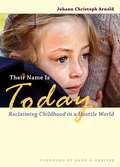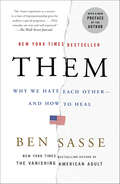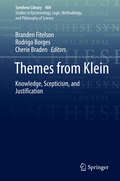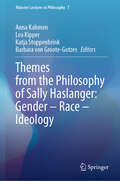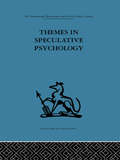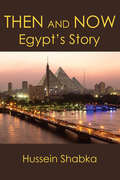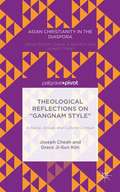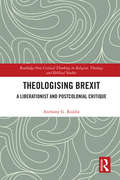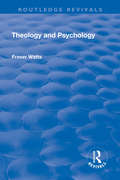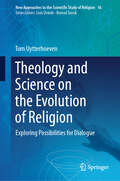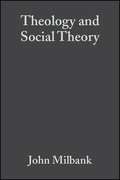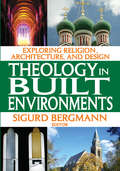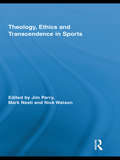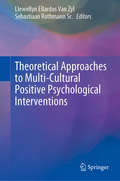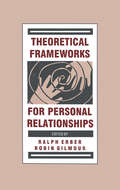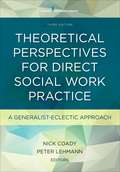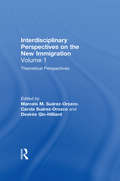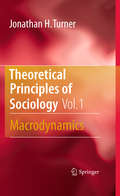- Table View
- List View
Their Best Behavior: Practical Strategies for 10 Common Classroom Challenges
by Allie SzczecinskiFind peace in the classroom with practical strategies for managing student behavior challenges In Their Best Behavior: Practical Strategies for 10 Common Classroom Challenges, seasoned educator Allie Szczecinski presents a lifeline for teachers overwhelmed by disruptive classroom behavior. The book addresses common problems and offers concrete, actionable strategies based on special education principles to manage student behavior effectively. With examples drawn from real-life classroom scenarios, Szczecinski illustrates how to diffuse disruptions and foster an environment conducive to learning. This invaluable guide transcends typical behavior management tactics by focusing on child-affirming and teacher-centric approaches. From tackling common issues like backtalk and aggression to handling work refusal and disengagement, Their Best Behavior equips you with the tools you need to restore calm and order to your classrooms. Inside the book: Gain insights into managing the ten most common elementary classroom behavior challenges Learn techniques backed by special education principles for a wide range of elementary settings Discover strategies that go beyond punitive measures to create a supportive and effective classroom environment Their Best Behavior is an essential read for elementary school teachers seeking support and strategies to manage challenging classroom behavior. Special education teachers, school leaders, and educators in need of practical solutions will find this book an instrumental resource in their professional development journey, helping them to foster a positive and productive learning atmosphere.
Their Name Is Today: Reclaiming Childhood In A Hostile World
by Johann Christoph Arnold Mark ShriverThere's hope for childhood. Despite a perfect storm of hostile forces that are robbing children of a healthy childhood, courageous parents and teachers who know what's best for children are turning the tide. Johann Christoph Arnold, whose books on education, parenting, and relationships have helped more than a million readers through life's challenges, draws on the stories and voices of parents and educators on the ground, and a wealth of personal experience. He surveys the drastic changes in the lives of children, but also the groundswell of grassroots advocacy and action that he believes will lead to the triumph of common sense and time-tested wisdom. Arnold takes on technology, standardized testing, overstimulation, academic pressure, marketing to children, over-diagnosis and much more, calling on everyone who loves children to combat these threats to childhood and find creative ways to help children flourish. Every parent, teacher, and childcare provider has the power to make a difference, by giving children time to play, access to nature, and personal attention, and most of all, by defending their right to remain children.
Them: Why We Hate Each Other—and How to Heal
by Ben SasseThis New York Times bestseller “argues that Americans are richer, more informed and ‘connected’ than ever—and unhappier, more isolated and less fulfilled” (George Will, The Washington Post).Something is wrong. We all know it.American life expectancy is declining. Birth rates are dropping. Nearly half of us think the other political party isn’t just wrong; they’re evil. We’re the richest country in history, but we’ve never been more pessimistic. What’s causing the despair? In Them, former US senator Ben Sasse argues that, contrary to conventional wisdom, our crisis isn’t really about politics. It’s that we’re so lonely we can’t see straight—and it bubbles out as anger.Local communities are collapsing. Across the nation, little leagues and Rotary clubs are dwindling, and in all likelihood, we don’t know the neighbor two doors down. Work offers less security, few lifelong coworkers, shallow purpose. Stable families and enduring friendships—life’s fundamental pillars—are in statistical freefall. As a result, we rally against common enemies so we can feel part of a team. Foreign adversaries use technology to exploit these toxic divisions by sowing misinformation and mistrust, to confuse us, exhaust us, make us angry—and thereby make us weaker.Reversing our decline requires something radical: a rediscovery of real places and human-to-human relationships. Even as technology nudges us to become rootless, Sasse shows how only a recovery of rootedness can heal our lonely souls. America wants you to be happy, but more urgently, America needs you to love your neighbor and connect with your community. Fixing what’s wrong with the country depends on it.“Sasse is highly attuned to the cultural sources of our current discontents and dysfunctions. . . . an attempt to diagnose and repair what has led us to this moment of spittle-flecked rage. . . . a step toward healing a hurting nation.” —National Review“Perhaps at last we have a politician capable of writing a good book rather than having a dull one written for him.” —The Wall Street Journal“Unpretentious, thoughtful, and at times, quite funny . . . his arguments are worth reading—as are his warnings about what our country might become.” —NPR
Themen der Governance von Familienunternehmen: Einblicke zu Strukturen, Strategien und Führungspersönlichkeiten
by Hermut Kormann Birgit SubergDieses Buch konzentriert sich auf die Rolle des Beirats oder ähnlicher Governance-Gremien in Familienunternehmen und speziell auf Prozesse und Themen von strategischer Bedeutung. Es umfasst alle relevanten Themen, die regelmäßig behandelt werden müssen, wie Strategieentwicklung, Finanzmanagement und Führung. Zu jedem Thema werden die Vor- und Nachteile herausgearbeitet. Dies ist eines der wenigen Bücher, das sich mit Familienunternehmen befasst, von den Governance-Systemen bis hin zur Rolle der Führungskräfte. Die von den Autoren sorgfältig gesammelten Beispiele und die eingehende Diskussion der Themen bieten dem Leser wertvolle Einblicke, um die Wirksamkeit der Unternehmensführung zu bereichern.
Themenkarrieren in der Wissenschaft: Die Entstehung der Themen Stadtschrumpfung und Klimawandel in der Raumforschung (Organization & Public Management)
by Andreas GravertDiese Open-Access-Publikation ist ein Plädoyer, das Verständnis von Themenkarrieren als integralen Bestandteil der Wissenschaft zu vertiefen und für die Reflexion wissenschaftlicher und planerischer Praxis zu nutzen.Welchen Gegenständen die Wissenschaft besondere Aufmerksamkeit beimisst, unterliegt einem dynamischen Wandel. Einige Themen, die lange Zeit Desinteresse und Ablehnung hervorriefen, rücken schlagartig in den Fokus um anschließend wieder abnehmende Aufmerksamkeit zu verzeichnen. Weder die Ursache noch der Zeitraum der anfänglichen Ignoranz, des abrupten Durchbruchs oder der anschließenden Ermüdung kann jedoch aus „rein wissenschaftlichen“ bzw. vermeintlich „objektiven“ Selektionskriterien erklärt werden. Wie also entstehen Themen in der Wissenschaft?Anhand der Themenkarrieren Schrumpfende Städte und Klimawandel wird untersucht, wie Aufmerksamkeit für ein Thema entsteht, welche sozialen Mechanismen dem Themenverlauf zugrunde liegen und welche Auswirkungen Themenkarrieren auf die planungswissenschaftliche Disziplin haben. Hierbei werden quantitative Methoden der Bibliometrie und der Netzwerkanalyse mit qualitativen Methoden der empirischen Sozialforschung in einer institutionalistischen Perspektive vereint.
Themes from Klein: Knowledge, Scepticism, and Justification (Synthese Library #404)
by Branden Fitelson Rodrigo Borges Cherie BradenThis volume features more than fifteen essays written in honor of Peter D. Klein. It explores the work and legacy of this prominent philosopher, who has had and continues to have a tremendous influence in the development of epistemology. The essays reflect the breadth and depth of Klein's work. They engage directly with his views and with the views of his interlocutors. In addition, a comprehensive introduction discusses the overall impact of Klein's philosophical work. It also explains how each of the essays in the book fits within that legacy. Coverage includes such topics as a knowledge-first account of defeasible reasoning, felicitous falsehoods, the possibility of foundationalist justification, the many formal faces of defeat, radical scepticism, and more. Overall, the book provides readers with an overview of Klein’s contributions to epistemology, his importance to twentieth and twenty-first-century philosophy, and a survey of his philosophical ideas and accomplishments. It's not only a celebration of the work of an important philosopher. It also offers readers an insightful journey into the nature of knowledge, scepticism, and justification.
Themes from Klein: Knowledge, Scepticism, and Justification (Synthese Library #404)
by Branden Fitelson Rodrigo Borges Cherie BradenThis volume features more than fifteen essays written in honor of Peter D. Klein. It explores the work and legacy of this prominent philosopher, who has had and continues to have a tremendous influence in the development of epistemology. The essays reflect the breadth and depth of Klein's work. They engage directly with his views and with the views of his interlocutors. In addition, a comprehensive introduction discusses the overall impact of Klein's philosophical work. It also explains how each of the essays in the book fits within that legacy. Coverage includes such topics as a knowledge-first account of defeasible reasoning, felicitous falsehoods, the possibility of foundationalist justification, the many formal faces of defeat, radical scepticism, and more. Overall, the book provides readers with an overview of Klein’s contributions to epistemology, his importance to twentieth and twenty-first-century philosophy, and a survey of his philosophical ideas and accomplishments. It's not only a celebration of the work of an important philosopher. It also offers readers an insightful journey into the nature of knowledge, scepticism, and justification.
Themes from the Philosophy of Sally Haslanger: Gender – Race – Ideology (Münster Lectures in Philosophy #7)
by Anna Kahmen Barbara von Groote-Gotzes Lea Kipper Katja StoppenbrinkThis book offers a critical discussion of Sally Haslanger's philosophical oeuvre. Published on the occasion of the annual Münster Lectures in Philosophy held by Prof. Haslanger in the winter of 2019, it covers both her prominent work on the themes of gender, race, and ideology, as well as her research on social practices and social structures. Conceptual, methodological, practical as well as normative approaches are pursued to more closely understand Sally Haslanger’s claims, arguments, and discursive goals. The direct correspondence between Sally Haslanger and her interlocutors makes this a very unique book suitable for both advanced scholars as well as graduate students.
Themes in Speculative Psychology
by Nehemiah JordanTavistock Press was established as a co-operative venture between the Tavistock Institute and Routledge & Kegan Paul (RKP) in the 1950s to produce a series of major contributions across the social sciences. This volume is part of a 2001 reissue of a selection of those important works which have since gone out of print, or are difficult to locate. Published by Routledge, 112 volumes in total are being brought together under the name The International Behavioural and Social Sciences Library: Classics from the Tavistock Press. Reproduced here in facsimile, this volume was originally published in 1968 and is available individually. The collection is also available in a number of themed mini-sets of between 5 and 13 volumes, or as a complete collection.
Then and Now: Egypt's Story
by Hussein ShabkaA sociologist examines the history of Egypt from the pharaohs to the present, shedding light on its cultural deterioration and the dilemmas it faces today.The story of Egypt’s long history is one of gradual descent from a wealthy, organized, sophisticated society to its contemporary milieu of corruption and poverty. For more than four thousand years, it earned the moniker om el donya, mother of the world. But when Cleopatra died, the independent rule of the pharaohs died with her. This seismic event not only transferred power to Rome, but also shattered the foundations of Egyptian society.For the following two millennia, a succession of foreign occupations and despotic rulers undermined Egypt’s national identity. They exported her wealth, imported a new language and culture, and spawned social values that are inimical to the very notion of modernity. Understanding these developments provides one possible route to getting a handle on the social and cultural situation in Egypt today.
Theologia poetica im 21. Jahrhundert: Die kriminalliterarische Wirklichkeitssicht des Heinrich Steinfest (pop.religion: lebensstil – kultur – theologie)
by Friederike JaekelDas vorliegende Buch zielt auf eine theologische Sensibilisierung für explizit nicht religiös qualifizierte Literaturformen. Durch eine interdisziplinäre und kulturhermeneutische Konzeption wird ein Beitrag für die Praktische Theologie, den aktuellen literaturtheologischen Forschungsdiskurs sowie für die Gestaltung von Kirche und Predigt sichergestellt. Im Rahmen einer exemplarischen Auseinandersetzung mit dem kriminalliterarischen Werk des Schriftstellers Heinrich Steinfest wird der Frage nachgegangen, ob sich innerhalb eines literarischen Werks eine sogenannte unsichtbare Theologie ausmachen lässt, die sich als die Artikulation und Reflexion einer unsichtbaren Religion verstehen lässt und somit ein neues Licht auf die Frage nach der Umformung des christlichen Denkens in der Neuzeit wirft.
Theological Perspectives on Reimagining Friendship and Disability
by Martina VukThis book rethinks the anthropology of friendship from the perspective of theology and disability, and suggests the respect for human dignity and the person´s vulnerability as the criterion in reconsidering such an anthropology. The reality of disability is not only the reality of being in the world, but also concerns the concept of the meaning of otherness and being created as an image of God. The constructive critique that the emergence of disability as a human condition posits to theo-anthropological and ethical concepts is the quest of the renewal of theo-anthropological and ethical knowledge on the meaning of disability, otherness and friendship. The theological and anthropological entities, such as disability and friendship, are interconnected in a sense that the meaning of the one needs to be explained in the light of the other, and vice versa. The renewal of certain anthropological categories in such regard is a search for a deeper understanding of humanity, not apart from, but in light of, the presence of disability.The book examines the anthropological and theological systems regarding the theme of friendship and disability.
Theological Reflections on "Gangnam Style": A Racial, Sexual, and Cultural Critique
by Grace Ji-Sun Kim Joseph CheahAs we listen to Psy's music are we laughing at him or with him? This book responds to this question from historical and theological perspectives and tackles the pressing issues concerning racial stereotypes, imposed masculinity, and imitating another in order to ridicule him/her.
Theologising Brexit: A Liberationist and Postcolonial Critique (Routledge New Critical Thinking in Religion, Theology and Biblical Studies)
by Anthony G. ReddieThis book offers a comprehensive analysis of the theological challenge presented by the new post-Brexit epoch. The referendum vote for Britain to leave the European Union has led to a seismic shift in the ways in which parts of the British population view and judge their compatriots. The subsequent rise in the reported number of racially motivated incidents and the climate of vilification and negativity directed at anyone not viewed as ‘authentically’ British should be a matter of concern for all people. The book is comprised of a series of essays that address varying aspects of what it means to be British and the ways in which churches in Britain and the Christian faith could and should respond to a rising tide of White English nationalism. It is a provocative challenge to the all too often tolerated xenophobia, as well as the paucity of response from many church leaders in the UK. This critique is offered via the means of a prophetic, postcolonial model of Black theology that challenges the incipient sense of White entitlement and parochial ‘nativism’ that pervaded much of the referendum debate. The essays in this book challenge the church and wider society to ensure justice and equity for all, not just a privileged sense of entitlement for some. It will be of keen interest to any scholar of Black, political and liberation theology as well as those involved in cultural studies from a postcolonial perspective.
Theology and Marxism in Eagleton and Žižek: A Conspiracy of Hope
by Ola SigurdsonTaking its cue from the renewed interest in theology among Marxist and politically radical philosophers or thinkers, this study inquires into the reasons for this interest in theology focusing on the British literary theorist Terry Eagleton and the Slovenian philosopher and psychoanalyst Slavoj Žižek, as two contemporary prominent Marxist thinkers.
Theology and Psychology (Routledge Revivals)
by Fraser N WattsThis title was first published in 2002: Many people are now interested in the relationship between religion and science, but links between Christian belief and psychology have been relatively neglected. This book opens up the dialogue between Christian theology and modern scientific psychology, approaching the dialogue in both directions. Current scientific topics like consciousness and artificial intelligence are examined from a religious perspective. Christian themes such as God's purposes and activity in the world are then examined in the light of psychology. This accessible study on psychology and Christian belief offers students and general readers alike important insights into new areas of the "science and religion" debate.
Theology and Science on the Evolution of Religion: Exploring Possibilities for Dialogue (New Approaches to the Scientific Study of Religion #16)
by Tom UytterhoevenThis book studies the much-debated implications of sociobiology for religion. It explores the answers to questions such as: Is religion merely the result of natural selection? Do religious ideas literally make up people's minds, determining how they think and act? Critically engaging philosopher Daniel Dennett's view on cultural evolution, the book argues that the relation between religious concepts and religious believers is one of continuous, creative dialogue. This dialogical relation allows meaning to emerge and leaves room for free will, thus contradicting Dennett's position. The book provides a concise introduction to the questions at play where religion and science meet. Drawing on sources from science, philosophy and theology, it offers an example of how a constructive interaction of different disciplines can lead to new perspectives on the complex phenomenon of religion.
Theology and Social Theory: Beyond Secular Reason (2nd edition)
by John MilbankTheologian Milbank (religion, politics, and ethics; U. of Nottingham) wrote his treatise, first published in 1990, in the depths of the Thatcherite era, out of a conviction that a theological vision alone could challenge the emerging hegemony of neo-liberalism. Now that neo-liberalism has festered into a new mode of political tyranny, he finds the essential unity of the work even more apparent. He looks at theology in terms of liberalism, positivism, dialectics, and difference.
Theology in Built Environments: Exploring Religion, Architecture and Design
by Sigurd BergmannBuilt space is both a physical entity as well as a socially and historically constructed place. It constantly interacts with human beings, affecting their behavior, thinking, and feeling. Doing religious work in a particular environment implies acknowledging the surroundings to be integral to theology itself. The contributors to this volume view buildings, scriptures, conversations, prayers, preaching, artifacts, music and drama, and built and natural surroundings as contributors to a contextual theology.The view of the environment in which religion is practiced as integrated with theology represents not just a new theme but also a necessity if one is to understand religion's own depth. Reflections about space and place and how they reflect and affect religious experience provide a challenge and an urgent necessity for theology. This is particularly important if religious practitioners are to become aware of how theology is given expression in the existential spatiality of life. Can space set theology free? This is a challenging question, one that the editor hopes can be answered, at least in part, in this volume.The diversity of theoretical concepts in aesthetics, cultural theory, and architecture are not regarded as a problem to be solved by constructing one overarching dominant theory. Instead, this diversity is viewed in terms of its positive potential to inspire discourse about theology and aesthetics. In this discourse, theology does not need to become fully dependent on one or another theory, but should always clearly present its criteria for choosing this or that theoretical framework. This volume shows clearly how different modes of design in sacred spaces capture a sense of the religious.
Theology, Ethics and Transcendence in Sports (Routledge Research in Sport, Culture and Society)
by Jim ParryThis book provides an inter-disciplinary examination of the relationship between sport, spirituality and religion. It covers a wide-range of topics, such as prayer and sport, religious and spiritual perspectives on athletic identity and ‘flow’ in sport, theological analysis of genetic performance enhancement technologies, sectarianism in Scottish football, a spiritual understanding of sport psychology consultancy in English premiership soccer and how Zen may be useful in sports performance and participation. As modern sport is often intertwined with commercial and political agendas, this book also provides an important corrective to the “win at all costs” culture of modern sport, which cannot always be fully understood through secular ethical inquiry. This is a unique and important addition to the current literature for a wide-range of fields including theology and religious studies, psychology, health studies, ethics and sports studies.
Theoretical Approaches to Multi-Cultural Positive Psychological Interventions
by Llewellyn Ellardus Van Zyl Sebastiaan RothmannThis volume provides theoretical perspectives on and approaches to the development or enhancement of positive psychological capacities within various multi-cultural professional and organizational contexts. Specifically, it presents theoretical frameworks for the identification, development and optimization of positive psychological capacities through a contemporary, multi-cultural and multi-disciplinary lens. In recent years, the applicability of positive psychological intervention (PPI) techniques has transposed the boundaries of clinical practice into a wide array of complementary domains such as law, education, business and even design sciences such as architecture. These interventions target the enhancement of positive psychological capacities (e.g. strength-identification and use; high-performance learning; appreciative design; job-crafting) in order to not only improve individual functioning, well-being and the treatment of various forms of psychopathology but also to enhance team functioning/performance, organizational growth and community development. Despite its importance, very little research has been done on the design of PPIs applicable to multi-cultural contexts. The contributions to this volume provide insights into this hitherto neglected area of research.
Theoretical Frameworks for Personal Relationships
by Robin Gilmour Ralph ErberThe past two decades have seen a tremendous increase in research and scholarship devoted to personal relationships. From rather scattered beginnings a recognizable and recognized field has emerged, whose strength and health is reflected in a wide array of indicators. The editors contend that while the vigor of the field is often shown in the diversity and innovation of its research, it is in the theoretical domain that they find evidence of a real coming of age. This volume provides grounds for arguing that the diversity of theorizing is particularly healthy at this point. The reader will notice that there is some diversity in terms of how much theory and research is contained in each chapter -- some are purely theoretical; others are complemented by original pieces of empirical research. The editors and contributors are from different countries -- another way in which the diversity of this book manifests itself. The variety of the frameworks presented are seen as a strength, as building on established strengths elsewhere to feed into relationship research and enhance its vitality. Each chapter makes its own contribution to thinking and research about personal relationships. As a group they add to an exciting collection that not only reflects a richness of conceptual backing, but also a wide range of usable theoretical structures.
Theoretical Perspectives for Direct Social Work Practice: A Generalist-Eclectic Approach
by Nick Coady Peter Lehmann<p>This expanded third edition of a popular textbook provides a completely revised and updated overview of the theories, models, and therapies that inform direct social work practice. The text is grounded in generalist social work principles and values and promotes a problem-solving model of social work practice as a framework for the eclectic use of theory, as well as for integrating the artistic, reflective elements of practice. It provides in-depth coverage of select psychodynamic, cognitive-behavioral, humanistic, critical, and postmodern theories. <p>The third edition features a new section on Critical Theories, where a new chapter on Empowerment Theory is included with a completely revised chapter on Feminist Theory. A new chapter on Strengths-based Social Work has been added to the section on meta-theories for social work practice. Other new chapters include Emotion-focused Therapy and Collaborative Therapy. These revisions are based on suggestions from an extensive survey of professors.</p>
Theoretical Perspectives: Interdisciplinary Perspectives on the New Immigration
by Marcelo M. Su Carola Su DesirThis six-volume set focuses on Latin American, Caribbean, and Asian immigration, which accounts for nearly 80 percent of all new immigration to the United States. The volumes contain the essential scholarship of the last decade and present key contributions reflecting the major theoretical, empirical, and policy debates about the new immigration. The material addresses vital issues of race, gender, and socioeconomic status as they intersect with the contemporary immigration experience. Organized by theme, each volume stands as an independent contribution to immigration studies, with seminal journal articles and book chapters from hard-to-find sources, comprising the most important literature on the subject. The individual volumes include a brief preface presenting the major themes that emerge in the materials, and a bibliography of further recommended readings. In its coverage of the most influential scholarship on the social, economic, educational, and civil rights issues revolving around new immigration, this collection provides an invaluable resource for students and researchers in a wide range of fields, including contemporary American history, public policy, education, sociology, political science, demographics, immigration law, ESL, linguistics, and more.
Theoretical Principles of Sociology, Volume 1: Macrodynamics
by Jonathan H. TurnerIn a general study of Sociological Theory, social processes are usually broken down into three tiers: macrodynamics (societies and large-scale institutions), microdynamics (interpersonal encounters), and mesodynamics (corporations, communities, smaller organizations). In this seminal work, the author pulls these separate areas of research into one comprehensive general theory of social reality.<P><P> More than analytical distinctions or research terminology, the author demonstrates that the social world actually unfolds along these three (macro, micro, and meso) levels of interaction. By developing a set of explanatory, testable, repeatable principles, the author creates a general empirical framework for sociological research. The three volumes of Principles of Sociology explore each level of social dynamics individually, with cross-references to bring the three together. This work will be essential for researchers in Sociological Theory and Social Psychology. Individual volumes will present new research of interest for researchers in Race and Ethnicity, Stratification, Demography, Political Sociology, Organizations and Community Movements, Motivation and Emotions.
